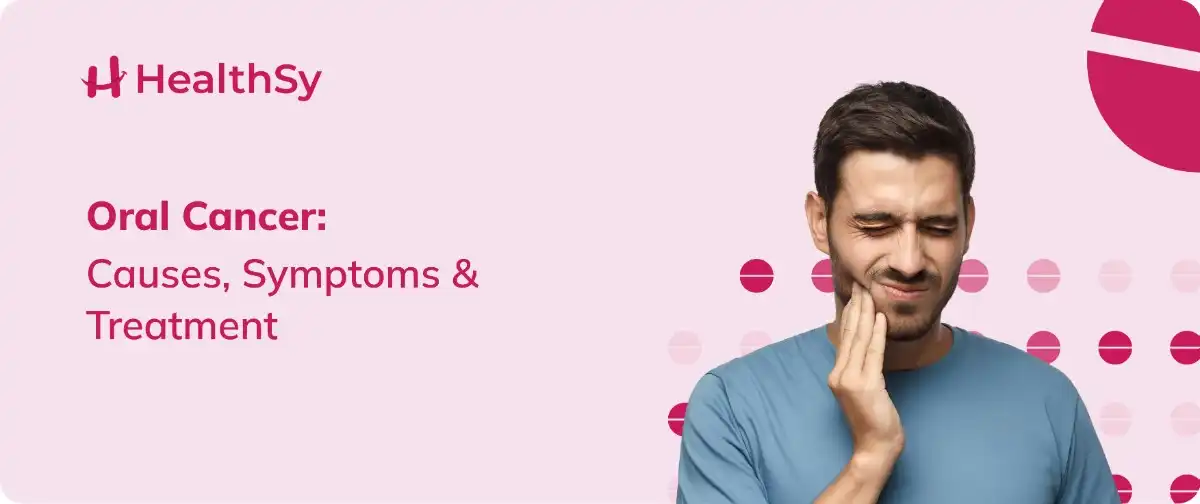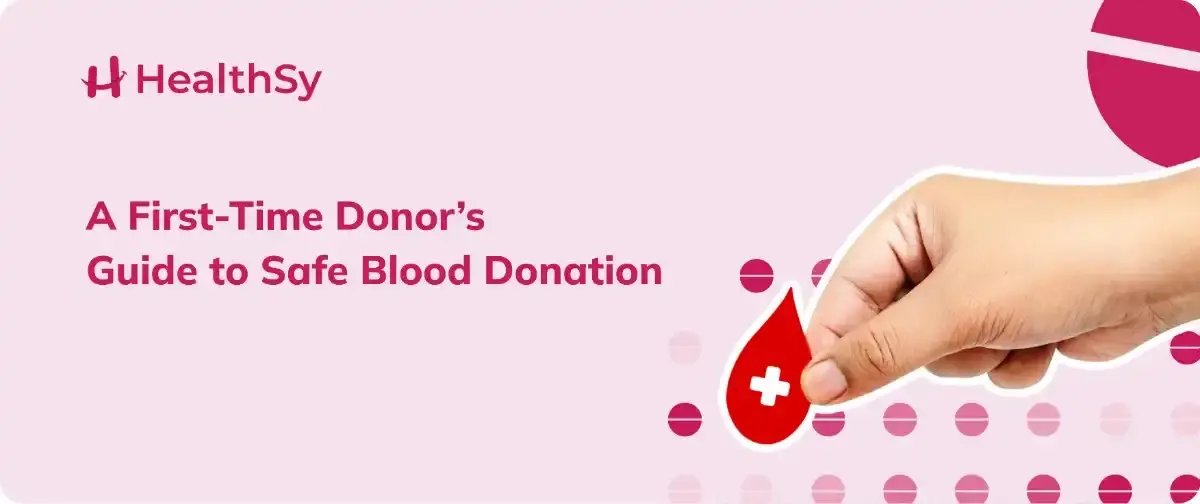Oral Cancer: Causes, Symptoms & Treatment

Oral cancer is a severe illness and a life-threatening condition that affects many people globally. This type of cancer can develop in any part of the mouth, including the tongue, lips, gums, cheeks, or the roof or floor area of the mouth. Detecting it early and treating it on time will significantly increase the survival rates. So, this blog informs us about oral cancer and how to detect it early and get it treated.
Oral Cance Causes
The development of oral cancer involves a lot of risk factors. The most common causes of oral cancer are tobacco usage in the form of cigarettes, chewing gums, snuff, etc.; excessive use of alcohol could also cause oral cancer since the combination of tobacco and alcohol leads to dangerous conditions.
Another important cause of oral cancer is HPV (Human papillomavirus) infection, HPV-16 in particular. Prolonged exposure to the sun can cause lip cancer. Sometimes, poor oral hygiene also weakens the immune system and enhances susceptibility. Will all these, even genetics, play a role in oral cancer, making a few people prone to the illness?
Oral Cancer Symptoms
Knowing the symptoms of oral cancer at an early stage can save many lives. The most prevalent symptom is seeing a sore in the mouth that has not been cured for a long time. Sometimes, a red or white patch inside the mouth could also be a symptom of oral cancer. A few other common symptoms include chewing, speaking, and swallowing challenges. Continuous pain in the mouth or feeling a lump in the cheek and numbness in the tongue are also a few warning signs of oral cancer.
Even if you experience sudden bleeding in the mouth, it is essential that you get it tested. Always consult your doctor immediately if you see any of the above symptoms in your body.
Oral Treatment
The treatment for oral cancer depends upon the stage and the location affected by cancer. The primary treatment would be surgery for early-stage oral cancer. This procedure involves removing the tumor and the lymph nodes nearby.
Radiation therapy is yet another standard treatment for oral cancer. It makes use of high-energy rays to kill the cancer cells. In a few advanced cases, chemotherapy is combined with radiation therapy to improve the treatment effectiveness.
Apart from these two, there is targeted therapy, which is a significantly newer approach that concentrates on the molecules involved in the development of cancer cells.
Immunotherapy is an evolving treatment for oral cancer that boosts the immune system to combat the disease.
A multidisciplinary approach, including speech therapy and rehabilitation, helps patients regain function and improve their quality of life post-treatment.
Living with Oral Cancer
oral cancer diagnosis can be indeed overwhelming, but support from family, friends, and other health professionals could make and feel a difference. Patients going through this can experience severe symptoms such as difficulty in swallowing, speaking, and eating. Proper counseling and rehab will help patients stay strong and positive.
Joining support groups and mental well-being sessions would also help the patients share their experiences and get emotional support. Following medicines properly and getting regularly checked will help them stay on track throughout their recovery.
Whom to Consult for Oral Cancer?
Specialists who treat oral cancer include head and neck surgeons, oral and maxillofacial surgeons (dentists specializing in mouth, face, and jaw surgery), and otolaryngologists (ear, nose, and throat doctors).
Conclusion
Oral cancer is a very serious issue, but early detection and treatment will help increase the rate of survival. So, it is vital to understand the causes, recognize the symptoms, and seek immediate medical attention to combat oral cancer efficiently. Also, making changes to lifestyle, maintaining good oral hygiene, visiting a dentist, getting regular checkups, and taking preventive measures can decrease the risk of oral cancer and can save plenty of lives.

Every year, thousands of people participate in cyclothons, a mass cycling event that combines fitness, socialization, and community. Whether you are a seasoned rider, a health-conscious individual, someone who loves cycling, or someone willing to participate in a cyclothon for the first time, this blog has got you covered!
We’ll walk you through a few tips that will help you train, eat, and gear up like a professional for cyclothons. Knowing the strategies, tracking your progress, following a legitimate diet, and understanding the pitfalls as a beginner are all essential things to be aware of. By the end, you must remain fully prepared not only to survive the big day but also to feel satisfied about the entire journey, both physically and mentally.
Let’s get started!
Cyclothon and Cycling Benefits
Cycling isn’t just a sport; it's a lifestyle that offers incredible benefits to both your body and mind. It:
- Improves cardiovascular health
- Strengthens your muscles
- Increases your mental and physical resilience
Cyclothon Training Tips
- Begin Early: A 10-12 training session with 2-4 rides per week will help build better endurance.
- Strength and flexibility training: Incorporating stretching and following a few core workouts can help reduce the risk of injury.
- Tech Tuning: Ensure your bike is tuned correctly and that its gears and brakes are in good working order.
- Taper and rest: Relax and ease off for a week before the big day to allow your body to store energy and recover.
What to Eat Before and After the Cyclothon?
Pre-cyclothon Nutrition:
- Carbs: Bananas, oats, whole-grain toast
- Hydration: 500ml water and electrolytes
- Protein: Eggs, Greek yogurt (keeps you full).
During the Ride
- Every 45-60 mins:
- Energy gels/bars (30-60g carbs/hour).
- Hydration: Sip water or electrolyte-rich beverages (avoid sugary drinks).
Post-Ride Recovery
- Within 30 mins: Protein shake + banana.
- Meal (1-2 hours after): Lean protein (chicken/fish) + complex carbs (quinoa, sweet potatoes).
- Essential Cycling Tech Checklist
Bike Setup:
- Saddle Comfort
- Tune-up
- Tires
Safety and Accessories:
- Helmet (MIPS tech for safety purposes)
- Lights and reflectors (If riding late/early)
- Cycling Gloves (cushioning and gripped)
Must-Have Extras:
- Portable pump + spare tube.
- Multi-tool for quick fixes.
- Energy gels + hydration pack
Easy Ways to Track Your Progress During a Cyclothon
- Use a GPS app or a cycling computer
- Measure your power and heart rate
- Join local events and group rides
- Plan for interval training
- Maintain a training journal
- Consistent training helps you maintain your form and identify pitfalls at the earliest opportunity, before the cyclothon.
Common Mistakes Beginners Make in Cyclothons
- Ignoring Hydration or Under-Fueling: Ignoring the importance of keeping your body hydrated during rides will lead to stomach cramps and bloating.
- Overeating: Consuming excessive amounts of food at once can lead to digestive issues. Instead, micro-fuelling every 20-30 minutes will work better.
- Skipping Gear Preps: Poorly maintained bikes, missing spares, or untested bikes can leave you stranded at the start line or in the middle.
- Pushing too hard in the end: Sprinting in the early stages can drain you. So, find a sustainable pace, take it slow, and train well.
- Nutrition experimentation: Trying new protein bars, gels, or drinks during the cyclothon day might lead to health issues. So, try them during the training period to see if they will suit your body.
- Missing out on training sessions: Neglecting your training sessions is one of the biggest mistakes. Additionally, prioritize your gut health by incorporating a balanced carb intake tailored to your workload.
Recovery After the Event
- Cool Down: 10-15 mins of easy spinning.
- Stretch: Focus on hamstrings, quads, and lower back.
- Rehydrate: Coconut water or electrolyte drinks.
HealthSy Title Sponsors the Chennai Cyclothon — In Association with The Times of India
Mark your calendars! On 22 June 2025, HealthSy proudly takes the spotlight as Title Sponsor of the Chennai Cyclothon, a premier cycling event hosted at the scenic Indian Maritime University, ECR, in association with “The Times of India”.
Whether you're a weekend warrior, fitness buff, or seasoned rider, HealthSy’s sponsorship underscores its commitment to advancing wellness through community-oriented initiatives. This collaboration elevates the Cyclothon from a race to a celebration of cycling benefits, community energy, and city pride. Register Now.
Conclusion
Structured and strategic training, smart dieting, well-prepared technology, and mindfulness will help you overcome the challenges and common mistakes you make. With all these in the right state, you’re all set for a Cyclothon. Cycle soulfully and reap the benefits of cycling, along with the experience of gaining more confidence both mentally and physically.

Ear problems can range from severe to mild, depending on their cause, and can affect anyone, from children to older adults. Fortunately, there are many ear drops available that can help ease your pain and treat any ear-related issues. Here, in this blog, let's explore some of the best ear drops for ear pain, earwax removal, and ear infections.
Understanding Ear Drops
Ear drops are liquid solutions made to treat various ear conditions by being applied directly into the ears. They can help with the following.
Best Ear Drops for Earwax Removal
Excessive earwax can cause blockages, discomfort, and hearing loss. Using the right ear drops can help loosen the blockages. A few of the best ear drops for wax removal are:
- Relieving ear pain
- Treating ear infections (bacterial or fungal)
- Softening and removing earwax
Depending on the issue, ear drops may contain antibiotics,
antifungals, analgesics, or agents that dissolve wax.
Top Wax-Removal Ear Drops
- Carbamide Peroxide Drops – Bubble away stubborn wax (e.g., Debrox).
- Mineral or Olive Oil Drops – Gently soften wax over time.
- Glycerin-Based Drops – Help wax slide out naturally.
Note: Avoid using cotton swabs, as they can push wax deeper.
Instead, let the drops work for 5-10 minutes before rinsing with warm water.
Effective Ear Drops for Infection
Ear infections can be caused by bacteria or fungi, leading to pain, swelling, and discharge. Ear drops for infection often contain antibiotics or antifungals to combat the root cause.
Types of Ear Drops for Infections:
- Antibiotic Ear Drops (e.g., Ciprofloxacin, Ofloxacin) – Treat bacterial infections.
- Antifungal Ear Drops (e.g., Clotrimazole) – Combat fungal infections like swimmer's ear.
- Steroid-containing drops (e.g., Hydrocortisone) – Reduce inflammation and itching.
Note: Never use ear drops for infection without a prescription if you suspect a ruptured eardrum.
Best Ear Drops for Ear Pain
If you're experiencing discomfort, ear drops for ear pain can provide fast relief. Common causes of ear pain include:
- Swimmer's ear (otitis externa)
- Middle ear infections (otitis media)
- Pressure changes (e.g., from flying)
Recommended Ear Drops for Pain Relief:
- Antipyrine & Benzocaine Drops – Numb the ear canal to reduce pain.
- Olive Oil or Mineral Oil Drops – Naturally soothe irritation.
- Hydrogen Peroxide-Based Drops – Help with mild inflammation.
- Always consult a doctor before using medicated ear drops, especially if you have a perforated eardrum.
How do You Use Ear Drops Properly?
The best way to use ear drops is as follows:
- Lie on your side with the affected or infected ear facing up
- Gently pull the earlobe to make your ear canal straight
- Put a few drops directly (3-5 drops usually)
- Stay still for a few minutes and let the drops absorb
- Wipe away the rest and clean it with a tissue
When to See a Doctor?
When you experience severe ear pain or symptoms related to your ears that persist or worsen, it's time to consult your ENT specialist. The following are a few situations in which you should not delay getting medical advice:
- Bleeding and severe pain
- Dizziness due to hearing loss
- Signs of ruptured eardrums
- Long-lasting symptoms
Final Takeaway
Ear-related issues can affect anybody of any age group and gender. It is a prevalent condition that occurs due to various factors. If you need ear drops for an infection, pain, or earwax, always learn to use the right ones correctly for a quick recovery. Please follow the instructions and seek medical advice immediately if symptoms persist.

A gluten-free diet is typically recommended for individuals with celiac disease, wheat allergies, or gluten sensitivity. Gluten is a protein found in wheat, rye, and barley. It can trigger inflammation, digestive issues, and various other health issues in sensitive individuals. Whether you're planning to refine your diet or follow a gluten-free diet, this guide will help you make better and healthier choices.
Foods You Can Eat on a Gluten-free Diet
Naturally, gluten-free foods include the following:
Dairy Products
- Butter
- Yogurt
- Cheese
- Milk
Proteins
- Eggs
- Legumes
- Nuts and seeds
- Seafood and fish
- Meat
Gluten-free Alternatives
- Coconut flour, almond flour, chickpea flour
- Pasta, baked goods, and gluten-free breads
Fruits & Vegetables
- All fresh fruits (apples, bananas, berries, etc.)
- All fresh vegetables (leafy greens, carrots, broccoli, etc.)
- Frozen or canned varieties (check for additives)
Starches & Whole Grains
- Millet
- Sorghum
- Amaranth
- Sorghum
- Buckwheat
- Quinoa
- Rice (brown, wild, white)
- Corn
- Certified gluten-free oats
Foods You Can’t Eat on a Gluten-free Diet
Avoid the following foods when you are on a gluten-free diet:
Wheat-based products
- Couscous, pasta, bread
- Wheat flour (whole wheat, all-purpose, semolina)
- Cereals (unless labeled gluten-free)
- Cookies, cakes, and crackers
Barley and Rye
- Rye bread
- A few soy sauces (mainly contain wheat)
- Barley (beer, malt, malted vinegar)
Beverages to Avoid
- Beer (unless gluten-free)
- Some coffee creamers & malt drinks
Processed Food with Gluten that is Hidden
- Soups & sauces (may contain wheat thickeners)
- Processed meats (sausages, deli meats)
- Salad dressings & marinades
- Flavored chips & snacks
- Imitation seafood (e.g., crab sticks)
Tips for a Gluten-free Diet
- Read the food labels properly: Check if the food is gluten-free
- Avoid cross-contamination: Have a separate cooking utensil
- Talk to a dietician: Ensure to talk to a dietician before you begin with a gluten-free diet
- Choose good dine-outs: Pick restaurants with gluten-free alternatives
Final Takeaway
Following a gluten-free diet needs more awareness about it. With the proper knowledge and information, you can healthily maintain a good gluten-free diet. Always opt for naturally gluten-free foods and avoid packaged products that contain gluten. For both medical and personal reasons, you can still opt for a gluten-free lifestyle that is both healthy and delicious.
So, have you ever tried a gluten-free lifestyle? If not, give it a try for once!

Viral fever is a prevalent condition that affects people of all ages and both genders. While most viral fevers are mild and less harmful, there are cases in which they become dangerous. It is essential to understand the symptoms, available treatments, preventive measures, and the factors that contribute to the illness. Only then does it become easy to keep your body away from such fevers.
Are you ready to know more about viral fever? Then, continue reading as we guide you through all the essential information about viral fever.
What is Viral Fever?
Viral fever refers to the rise in body temperature caused by viral infections and various other factors. Apart from viral infections, several conditions related to viral fever include dengue, influenza, and the common cold. These infections trigger the body’s immune response, leading to fever and other symptoms.
Viral Fever Symptoms to Watch for
Knowing the symptoms of viral fever at the earliest will help manage the illness effectively. A few prevalent symptoms include:
High body temperature (above 100.4°F or 38°C)
- Chills and sweating
- Body aches and headaches
- Fatigue and weakness
- Sore throat and cough
- Runny or stuffy nose
- Loss of appetite
In severe cases, symptoms like persistent vomiting, rashes, or breathing difficulties may indicate complications requiring immediate medical attention.
Viral Fever Causes and Risk Factors
Several factors contribute to viral fever. A few are:
- Weakened immunity
- Seasonal changes
- Staying close to infected people
- Viral infections (Flu, dengue, malaria, chikungunya)
Viral Fever Treatments
Most viral fevers subside with proper rest and medication, but it is also crucial to know a few other things that can help treat the illness.
- Hydration
- Medications
- Home remedies
- Rest
When will Viral Fever become a Significant Threat?
While most viral fevers are harmless and can be treated with medication, a few conditions can be dangerous. So, consult your doctor right away if you:
- Have a high fever above 103 degrees Fahrenheit that does not subside
- Face severe dehydration issues
- Come across neurological symptoms that are completely abnormal, like confusion and seizures.
- Identify secondary symptoms, such as pneumonia and sinusitis.
Viral Fever Prevention Tips
Prevention is better than a cure! This is something that everybody remembers forever. Just as the saying goes, it is essential to stay proactive against any illnesses. The following are a few viral fever prevention tips that you should know:
- Maintain proper hygiene
- Keep your immunity boosted
- Eat healthy food
- Avoid crowded places
- Stay vaccinated
Final Thoughts
For most people, viral fever is a common and temporary illness that typically subsides with time and the use of medication. However, ignoring the increasing symptoms of this viral fever will lead to serious issues. Stay informed, take proper precautions, and consult your doctor when required. Always remember that Health comes first!

Blood donation is one of the most selfless and significant ways to save lives. If you choose to donate blood for the first time, you may have many questions and concerns regarding the process and your health. In that case, do not worry; this guide has got you covered. Here in this guide, we have listed all the required details regarding blood donation preparations, recovery, etc. Keep reading to know more.
Why is Blood Donation Essential?
Every two seconds, someone globally requires blood. Blood donation is a significant requirement since the need for blood is enormous in cases of surgeries, chronic conditions, and emergencies that require immediate blood, like road accidents. Donating blood one time could save up to three lives. This proves that blood donation directly contributes to the survival of people in your society.
Blood Donation Eligibility
Before you commit to the blood donation process, you must meet your eligibility criteria. Also, the criteria might vary based on regions, but the standard requirements include:
- Good health
- Age requirement between 17-65 years old (In some places, they allow younger and older donors on certain conditions)
- Weight at least 50 kgs (110 lbs)
- No recent tattoos or piercings (within the last 6 months)
Make sure to check
with your local blood donation center for eligibility and various other
guidelines.
Tips to Prepare for Blood Donation
Preparation is essential to ensure a smooth blood donation process. So, consider the following before donating blood:
- Hydrate well
- Eat healthy meals
- Get a good night's sleep
- Bring ID and donor data
Blood Donation Process
Step 1: Registration
Initially, you will be asked to register by providing the required details, such as filling out the blood donor questionnaire, so that you can access your health and eligibility.
Step 2: Health Screening
Secondly, a brief health checkup will be conducted to monitor your blood pressure, hemoglobin levels, and temperature.
Step 3: Donation
Next is your blood donation process, which will take 8-10 minutes. Approximately 1 pint of blood will be collected from your body during this process, which will take about an hour from registration to blood donation.
Step 4: Post-donation care
After the blood donation, you'll be given refreshments to help you stay hydrated and regain your fluids.
How often can Blood Donation be done?
You can donate blood every 56 days (Whole Blood), every 7 days, up to 24 times a year(platelets), every 28 days (plasma)
Benefits of Blood Donation:
Saving Lives: Every blood donation made can save up to 3 lives, offering more critical support to patients who are undergoing surgeries, cancer treatments, or suffering from any traumatic injuries.
Health Screening: Blood donation involves a complete health checkup, which can help detect health risks like anaemia and high blood pressure.
Heart Health: Blood donations will reduce the iron content stored in the body, potentially decreasing the risk of heart diseases.
Mental Well-being: Blood donation will improve emotional well-being by helping reduce stress and mental pressures.
Tips for a Better Blood Donation:
- Stay more hydrated
- Do avoid heavy exercising
- Keep your health in check
Final Thoughts
Embarking on your first blood donation journey is a noble step towards impacting the lives of others. By knowing more about the process and the benefits of donating blood in detail, you will ensure a good and safe blood donation journey. Remember, your blood donation journey not only helps those who are in need but also promotes your health and well-being.

Post A Comment